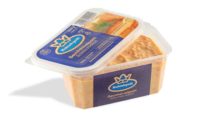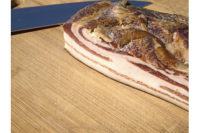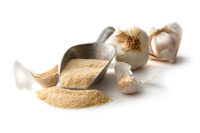In Search of a Deli Identity
By Robert J. Bregenzer
National and regional branded products dominate the retail deli. But more private-label offerings are likely to emerge as merchants move to stand out from competitors and target the budget shopper.
Marketers of meat and cheese are spending millions of dollars annually to generate brand awareness and position their products as the superior deli offerings. Yet, while such vehicles as media advertising, in-store signage, and sampling are helping to boost brand sales, they do not always result in deli dominance of the products.
Indeed, the popularity of private-label deli foods reveals that many consumers still consider price and appearance over name recognition when purchasing items.
The Madison, WI-based International Dairy*Deli*Bakery Association's Battle of the Brands research study, for instance, reports that while about 30 percent of consumers are paying more attention to brands, only 11 percent of consumers surveyed said brand is the first thing they look at when shopping for products.
Though more than half of the shoppers said they "often" or "sometimes" look for brands when buying meat and cheese at the deli service counter, many are still flexible in their purchasing criteria. Half said they would simply buy an alternative brand if the deli was out of their favorite meat, and 25 percent noted that they would purchase whatever was on sale.
FreshLook Marketing, a Hoffman Estates, IL-based provider of scanner-based sales data on perishable products, reports that private-label items account for about 25 percent of random-weight deli meat sales, and 30 percent of random-weight cheese purchases.
The figures have remained relatively consistent in recent years, but market share of store-branded items is likely to increase as retailers continue to look for ways to set themselves apartment from competitors, says Ed Mackowiak, FreshLook vice president of sales and marketing.
Creating signature foods
Tom Aquilina, president of Aquilina & Associates, a Crystal Lake, IL-based sales and marketing consulting firm, notes that more retailers are replacing branded products with their own premium items to create signature foods in the deli.
Giant Eagle Inc., for instance, a Pittsburgh-based chain of 219 stores in Ohio, Pennsylvania, West Virginia, and Maryland, has its private-label brand attached to about 40 percent of the stores' deli products. "We see Giant Eagle brands as a way to offer our customers great value and unique flavors that are only available at our locations, which helps strengthen and build the overall Giant Eagle brand and differentiates our shopping experience and product offerings from that of our competitors," says a spokesperson.
But there are obstacles to successfully launching private-label goods. Suppliers of national brands often provide consumers with dollars-off coupons and hold in-store samplings to forestall a switch to store-branded meats and cheese.
| Branded meats dominate the deli case | ||||||
| Type | 2004 Dollar Sales | 2005 Dollar Sales | % Change | 2004 Pound Sales | 2005 Pound Sales | % Change |
| Branded | 3,115.0 | 3,021.5 | -3% | 552.2 | 504.9 | -8.6% |
| Private Label | 1,044.7 | 999.4 | -4.3% | 175.6 | 158.9 | -9.5% |
| Private label by type | ||||||
| Regular | 486.9 | 456.7 | -6.2% | 88.6 | 76.8 | -13.3% |
| Premium | 557.7 | 542.7 | -2.7% | 87.0 | 82.1 | -5.4% |
| Source: FreshLook Marketing. Figures are random-weight sales for 52-week periods ending 5/30/04 and 5/29/05. Dollars and pounds are in millions. Regular private label will generally just have the retailer’s name on the package. Premium will have a signature brand. | ||||||
And the service deli often is too small to warrant the development of private-label products, says Frank Dell, president of Dellmart & Co., a Stamford, CT-based retail consultancy. It is unlikely that merchants will carry more than a couple of varieties of commodity products, such as cheddar cheese or turkey breast, he notes.
Nevertheless, some analysts say store brands are an obvious way for grocers to distinguish themselves from competitors.
While true differentiation is difficult - if not impossible-in the center store, retailers continue to look to perimeter departments to attract loyal shoppers. There already is a movement from national brands to store brands in the merchandising of fixed-weight cheese and fresh meats, which may well be a precursor to private-label growth in the deli.
Private-label products, however, could take awhile to flourish. "While the retailer recognizes the advantages of store brands in the service deli in terms of margins and differentiation, customers are often drawn by the strength, reputation, and promotional programs of the national brands," says Jim Hertel, senior vice president of Willard Bishop Consulting, a Barrington, IL-based food research company. Moreover, national brands provide shoppers with a higher degree of confidence that the product will be of a consistent quality, he notes.
However, there also are strong private-label benefits that are likely to appeal to more consumers. Deli cheese, for instance, costs about 24-percent less a pound than branded items, which is in line with the overall store differential between national brands and private-label goods.
But prices of deli meats can vary considerably, which may cause some consumer confusion over the value of private-label brands. For instance, recent data from FreshLook Marketing reveals that store-branded deli meats in many instances were priced slightly higher per pound than national brands.
Analysts say that is due to the product mix within deli meats, in which the highest volume items (i.e., turkey, ham, and beef), though usually national brands, are almost commodities and priced accordingly. Conversely, higher-priced specialty meats, such as prosciutto, are often the store's own premium private-label brand.
Many retailers also are blurring the distinction between private-label and national brands by not identifying the suppliers of products that are marketed behind glass in the full-service deli case.
"Consumers don't have a universal definition of what 'brand' means when it comes to deli meats and cheeses, though they most often equate a recognizable brand name with better quality or taste," says Mary Kay O'Connor, IDDBA director of education. "Deli brands can be everything from national manufacturers' brands to specialty regional brands to premium store brands."
Strength in private label
Retailers intent on executing a private-label initiative in the deli are more likely to succeed if they already have a well-established center-store private-label program, says Tom Stephens, founder of North York, ONT-based Brand Strategy Consultants.
"If shoppers have accepted the retailer's brand as a premium, high-quality product, and have a positive perception of the line, they will feel likewise in the deli where quality is a major concern," Stephens notes. Similarly, a merchant with a strong reputation for fresh produce can transfer that reputation to the deli, he adds.
Some industry observers say an optimal national brand/private-label mix will vary from store to store, based on local demographics and price. Affluent shoppers, they note, tend to look for well-known brands of deli meats -- such as Sara Lee, Healthy Choice, Butterball, and Krakus -- and retailers should accommodate those needs even if it means marketing fewer private-label products.
Many baby boomers also are willing to pay for high-quality, healthier food as they get older. "As the population ages, branded meats and cheese, particularly high-end brands and premium store brands, will be an area of growth," O'Connor says.
Yet, conventional store brands could displace items from national manufacturers in a more price-conscious environment. The IDDBA reports that in a list of 16 deli attributes presented to consumers, "carrying brands they know and trust" was the 14th most-frequently mentioned concern. It trailed such choices as "cleanliness," "consistently good tasting and fresh products," "safe food handling," and "quality products."
Building the image
In the end, the key role of private-label deli products may be to strengthen the retailer's image. "Store brands should be viewed as far more than margin boosters, and should serve as reinstatement of the store identification itself," says David Biernbaum, president of David Biernbaum Consulting Associates, a St. Louis, MO-based consumer products marketing firm. "Retailers must know their target customers and brands should reflect the store-branding philosophy." NP
Robert J. Bregenzer is president of Inverness Communications, an Inverness, IL-based communications consulting firm.





Report Abusive Comment